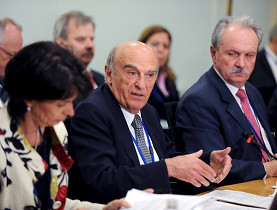
Merz links tax deal with UBS legal case in US

Finance Minister Hans-Rudolf Merz has called on the United States to drop legal proceedings against Swiss bank UBS over alleged tax fraud.
Merz met his US counterpart, Timothy Geithner, on the fringes of the annual meeting of the International Monetary Fund and the World Bank in Washington.
Merz said he was optimistic about the chances of a successful conclusion of negotiations on a new double taxation agreement with the US. The talks are scheduled to begin in the Swiss capital, Bern, next Tuesday.
“It is in the interest of both sides to reach a good accord. For us it is certainly crucial to find an agreement with a key partner,” said Merz who is also this year’s Swiss president.
During a meeting on Saturday, Merz told Geithner that the negotiations on double taxation could be affected if the case against UBS continued.
“I think Mr Geithner is aware that the legal case pending could be an obstacle for the tax accord,” said Merz.
He expressed his hope that a solution can be found no later than when the new double taxation agreement is to be put before parliament, a finance ministry statement said.
Geithner also showed understanding for the difficult situation of Switzerland’s leading bank, according to Merz.
However, the US finance minister did not comment.
The US justice authorities are suing UBS for suspected tax fraud committed by US clients. The Swiss authorities handed over data of 255 bank clients to Washington.
The US is demanding details of a further 52,000 accounts held in Switzerland.
Crisis meeting
Merz was in Washington to lead a Swiss delegation at the annual conference of the IMF and the World Bank which was marked by discussions over the global economic downturn.
The meeting of finance ministers and central bank governors was pessimistic about a swift recovery of the world economy.
“We have not reached the bottom of the valley yet. This will probably be the case in 2010,” said Jean-Pierre Roth, president of the Swiss National Bank.
“2009 will be difficult, but it could get worse next year. The jobless rate could get near record levels,” said Roth.
He also highlighted some positive elements, notably the bourse showing signs of recovery and a stabilisation of the property markets in the US.
Roth is cautiously optimistic that the Swiss economy will suffer slightly less from the crisis, compared with other European countries, as a result of the “dynamic situation of the consumer market”.
Measures
IMF experts last month urged the Swiss authorities to take “unconventional measures” to counter what they called “an unconventional situation”.
In their report the specialists warned of the continuing risks for the country’s major banks and their “toxic credits”.
The financial crisis could also damage the insurance sector as well as the pension funds, according to the IMF experts.
Both Merz and Roth declined to comment on the report in detail. They said the government was perfectly aware of the problems raised and necessary steps were being considered.
“It is important to monitor the insurance companies and the banks. The insurance sector is more or less healthy compared with the situation in other countries,” said Merz.
“I think there is no need to grant UBS further state funds for now,” he added.
Last October the bank benefited from a SFr6 billion ($5.8 billion) bailout package as well as a credit line of up to $54 billion from the government and the National Bank.
swissinfo, based on an article in French by Marie-Christine Bonzom in Washington
Switzerland is to grant the IMF a fixed-term credit line of up to $10 billion to increase the resources of the organisation.
The credit is subject to approval by both chambers of the Swiss parliament.
The IMF won pledges to the tune of $750 billion at the annual meeting of the IMF and the World Bank in Washington at the weekend.
Switzerland joined the IMF in 1992. It is one of 185 member countries.

In compliance with the JTI standards
More: SWI swissinfo.ch certified by the Journalism Trust Initiative






























You can find an overview of ongoing debates with our journalists here . Please join us!
If you want to start a conversation about a topic raised in this article or want to report factual errors, email us at english@swissinfo.ch.